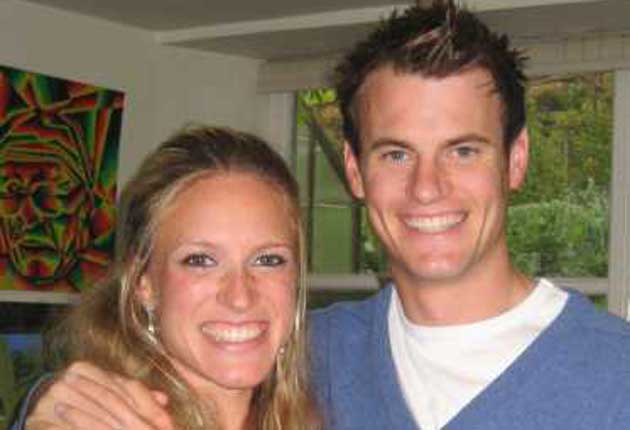Does pre-marital guidance counselling lead to a happy marriage?
The church is booked. The guests are invited. But should the happy couple undergo a spot of premarital therapy, Hollywood-style? Guy Adams takes to the couch to find out

Jerry Seinfeld recently announced his long-awaited return to TV with a reality show called The Marriage Ref. It'll see him help unhappy husbands and wives solve various day-to-day disputes, disagreements and couple-ish disgruntlements that are threatening to send their relationship the way of the divorce court. "I have discovered," he told Entertainment Weekly, "that the comedic potential of this subject is quite rich."
Quite how the happily-married comedian made this startling discovery, is anyone's guess. But when I first read his comments, they couldn't have seemed more ironic: I was sitting in a clinical psychologist's waiting room, next to my gorgeous and long-suffering fiancée, Katie. We were preparing to discuss intimate details of our private life with a local "shrink". Judging by the events that transpired later that day, Mr Seinfeld's show has indeed struck a rich seam of comedy.
At this point, a brief disclaimer: I am 31 years old. My fiancée is 30. Neither of us suffers from depression. We had happy childhoods. Our relationship, so far as I can make out, is in rude health.
And yet, we also live in Los Angeles, proud spiritual home to the therapy industry. In this town, people hire psychiatrists for their pets. Kids get through shrinks the way I used to plough through piano teachers. Entourage's Ari Gold and his wife virtually live on the couch. And, as I discovered last month, LA is a place where a man and a woman who wish to enter into an estate of holy matrimony must pony up $150-an-hour to undergo "pre-marital-guidance counselling".
Here's what happened. Last year, Katie agreed to marry me. Shortly afterwards, we decided to tie the knot in July, at a church in Monmouthshire near my parents' home. This, however, presented a minor problem: because we live and work a 10-hour flight away, the local vicar would be unable to "prepare" us for the occasion. Instead, she asked us to find an Anglican church in LA to get us ready.
In Britain, being "prepared" for a wedding is a quaintly pleasant ritual: it involves cups of tea, glasses of sherry, and a decent chinwag with the local rector. In Los Angeles, however, things are different: here, the Anglican (or Episcopalian) church likes to pack you off to the shrink.
So it came to pass that we found ourselves in the office of Dr Dominic Wallis, PhD, an affable, slightly rotund 50-something man described on his business card as a "clinical and consulting psychologist". Dr Wallis said he'd like to see us for three hour-long therapy sessions. Pre-marital guidance counselling, it turns out, revolves around two distinct procedures. The first required us to undergo a personality "evaluation".
This Orwellian process is known as an SDI or Strength Deployment Inventory test. It involves answering hypothetical questions about your personal priorities. Then someone will plot your "personality" on a multi-coloured graph. You will be revealed as a red, "assertive" person, a blue, "nurturing" person, or a green, "analytic" one. I fell into a portion of the graph that denotes "pain in the backside". So, Dr Wallis spent our first session advising Katie (a "nurturer") how to cope with spending the rest of her life doing just that.
Part two of the guidance is more problem-strewn. Dr Wallis, whose office contains an inordinate number of clocks, instructed us to fill in a 30-page multiple choice questionnaire on the state of our relationship.
On a scale of one to five (one "strongly disagree" and five "strongly agree") the questionnaire canvassed our view on 500 statements. Some felt tame: "I cannot foresee any circumstances in which I will not have a happy marriage" (I agreed). Others a touch creepy: "Sometimes, when my partner and I argue, I back down because I feel physically threatened" (I strongly disagree!). A few were downright prurient. One read: "I often worry about my partner's sexual history."
What I didn't know was that roughly a week later, Katie and I would be sat on Dr Wallis's sofa, as he divulged the contents of our questionnaires. This is where he revealed a small problem: I had "disagreed" with the statement that "I couldn't be happily married to anyone but my partner". Katie, meanwhile, had "agreed". There followed a sharp intake of breath. Divorces have been granted for less.
You might think it odd to prepare for a lifetime commitment by exposing your differences (Dr Wallis called them "growth areas"). Conversely, you might think it helpful – especially in a nation where 50 per cent of unions end in divorce.
Marriage counselling will certainly make for cracking TV, as Jerry Seinfeld says, but as I stared at my shoes and mumbled vague explanations, I couldn't help but think there were more pleasant ways to spend $150 an hour.
Some names have been changed
Join our commenting forum
Join thought-provoking conversations, follow other Independent readers and see their replies
Comments